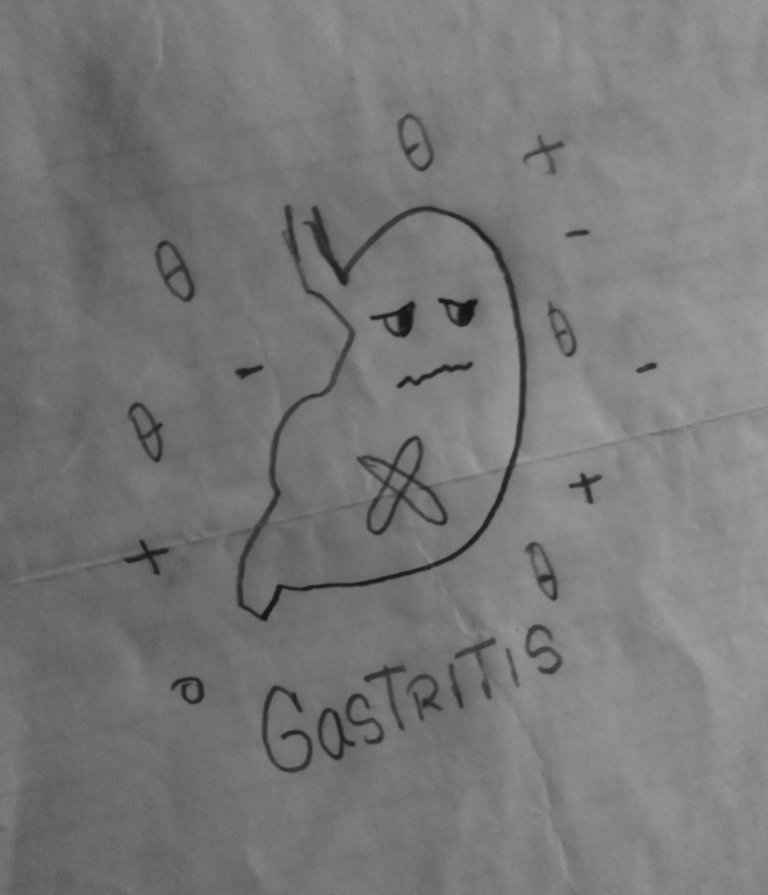Charlemos sobre Gastritis Aguda.
Hivers!!! Un cordial y afectuoso saludo, cargado de bendiciones traducidas en salud, salud física y mental, esa que hoy muchos anhelan para si mismos y familiares, y quiénes tenemos la dicha de tenerla debemos valorarla y cuidarla, con todas nuestras fuerzas.
Hoy es viernes, nuestra ventana al fin de semana, mientras me encuentro de guardia, aprovecharé para realizar un post, referente a un tema que ha predominado hoy en mi consulta: Gastritis Aguda.

Está afección entra en la clasificación de los síndrome dolorosos abdominales y no es para menos quienes lo padecen sienten por lo general un dolor tipo cólico insoportable, y sensación que describen como "fuego" o "que quema"a nivel estomacal.
En medicina la Gastritis es definida, como un grupo de enfermedades que genera inflamación de la mucosa gástrica, causando en ocasiones lesiones en la misma.
La etilogia de la gastritis es variada, puede ser de carácter viral, bacteriano (el más común) o sustancias que irritan al revestimiento del estómago, como el alcohol, el café, la nicotina, los alimentos con alto grado de químicos, e inclusive algunos medicamentos.
Es importante destacar que la aparición de la gastritis puede darse tanto de manera súbita como progresiva, teniendo como resultado los mismos síntomas, que tienden a empeorar al ingerir alimentos sobre todo los ricos en grasas o cítricos.
La mayoría de las personas hemos padecido alguna vez este tipo de afección, por lo tanto su incidencia es muy alta, sin embargo cuando se produce de manera continúa, puede volverse una enfermedad crónica siendo la causa más común según La Organización Mundial de la Salud el
Helicobacter pylori, una bacteria gran negativa que se transmite a través de saliva o materia fecal.
Síntomas:
Dolor en epigastrio (parte central del abdomen superior), vómitos, náuseas, diarreas, sensación de ardor en el abdomen, escalofríos, anoréxica y ansiedad.
Muchas veces el dolor se vuelve difuso, lo que genera confusión al momento de realizar el diagnóstico.
Diagnóstico.
El interrogatorio es imprescindible, pues te da una idea clara a través de las preguntas, se debe hacer énfasis en lo que ha ingerido el paciente, y si ha sentido anteriormente y con que frecuencia los síntomas antes mencionados.
El examen físico también forma parte del diagnóstico de la Gastritis se debe auscultar, percutir y palpar para poder asegurarse de que es una gastritis lo que afecta al paciente y no otra patología (apendicitis, pancreatitis, litiasis vesicular etc).
Exámenes complementarios como hematología completa,nos dará indicios de que tipo es la enfermedad (viral, bacteriana, otra), examen de heces, eco abdominal.
Tratamiento:
El tratamiento va en dependencia del agente causal, sin embargo la ingesta de líquidos y sueros orales estarán presentes en la mayoría de los casos para mantener al paciente hidratado.

Asimismo se suele indicar un inhibidor de la bomba de protones como el omeprazol o pantoprazol con el fin de generar alivio estomal.
El uso de antiácido también está indicado en caso del paciente manifieste acidez o ardor.
De ser una infección de origen bacteriano, el médico procederá a enviar antibiótico terapia.
Pronóstico:
Por lo general la gastritis tiene buen pronóstico, teniendo una recuperación satisfactoria en pocos días.
Gracias.
Dios siempre de Cabrestero.
PD: Dibujos de mi propiedad.
English:
Hiver!!! A cordial and affectionate greeting, loaded with blessings translated into health, physical and mental health, the one that today many yearn for themselves and their families, and those of us who have the joy of having it must value it and take care of it, with all our strength.
Today is Friday, our window to the weekend, while I am on call, I will take the opportunity to make a post, referring to a topic that has predominated today in my consultation: Acute Gastritis.
This condition is a condition that falls under the classification of abdominal pain syndromes and it is not for less that those who suffer from it generally feel an unbearable colic-type pain, and a sensation that is described as "fire" or "burning" at the stomach level.
In medicine, Gastritis is defined as a group of diseases that generates inflammation of the gastric mucosa, sometimes causing lesions in it.
The etiology of gastritis is varied, it can be viral, bacterial (the most common) or substances that irritate the lining of the stomach, such as alcohol, coffee, nicotine, foods with a high degree of chemicals, and even some medicines.
It is important to note that the appearance of gastritis can occur both suddenly and progressively, resulting in the same symptoms, which tend to worsen when eating foods, especially those rich in fat or citrus.
Most people have suffered from this type of condition at some time, therefore if incidence is very high, however when it occurs continuously, it tends to become a chronic disease being the most common cause according to the World Health Organization the
Helicobacter pylori, a gram negative bacteria that is spread through saliva or feces.
Symptoms:
Pain in the epigastrium (central part of the upper abdomen), vomiting, nausea, diarrhea, burning sensation in the abdomen, chills, anorexic and anxiety.
Many times the pain becomes diffuse, which generates confusion at the time of making the diagnosis.
Diagnosis.
The interrogation is essential, because it gives you a clear idea through the questions, of emphasizing what the patient has ingested, and if he has previously felt and how often the aforementioned symptoms.
The physical examination is also part of the diagnosis of Gastritis. It must be auscultated, allowed and palpated to be able to make sure that it is gastritis that affects the patient and not another pathology (appendicitis, pancreatitis, gallstones, etc.).
Complementary tests such as complete hematology, which will give us indications of the type of disease (viral, bacterial, other), stool examination, abdominal echo.
Treatment:
The treatment depends on the causal agent, however the administration of oral fluids and serums will be present in most cases to keep the patient hydrated.
Likewise, a proton pump inhibitor such as omeprazole or pantoprazole is usually indicated in order to generate stomach relief.
The use of antacid is also indicated in case the patient manifests heartburn or burning.
If it is a bacterial infection, the doctor will proceed to send antibiotic therapy.
Forecast:
In general, gastritis has a good prognosis, with a satisfactory recovery in a few days.
Thank you.
God always Cabrestero.
Su post ha sido valorado por @ramonycajal
Arturo: tus aportes a la comunidad desde tu saber y vocación son muy valiosos.
La sencillez y el genuino interés en colaborar con nuestra salud son extraordinarios.
Dios te bendice. ¡Muchas gracias!
Muchas gracias por leerme, me llena de dicha. Le mando un abrazo grande y Dios me lo bendiga.